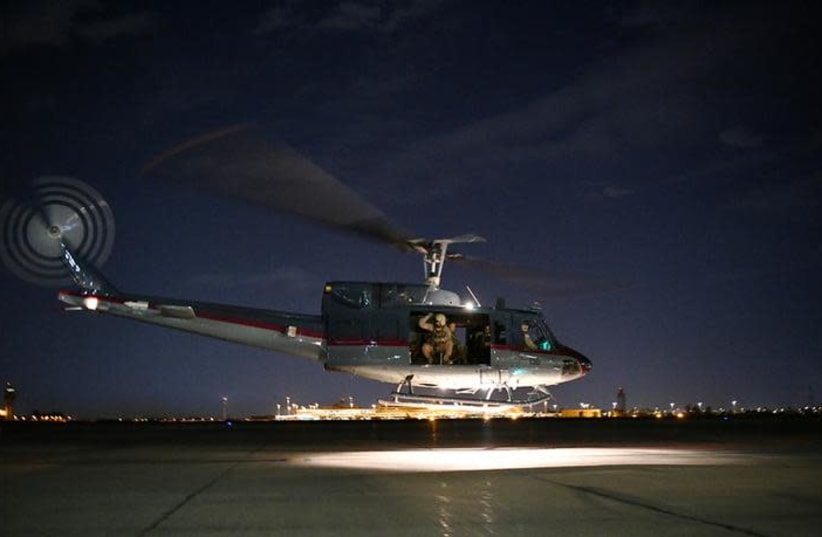As tensions continue to rise between Iran and the United States, the US State Department ordered the departure of “non-emergency US government employees” from Iraq on Wednesday.
The statement urged those affected to “avoid US facilities within Iraq” and “depart by commercial transportation as soon as possible.”
The statement came after US Central Command (CENTCOM) raised the threat level in Iraq and Syria on Tuesday, issuing a statement saying that American troops stationed there were on high alert against a possible “imminent” attack by Iran and its proxies.
“US Central Command, in coordination with Operation Inherent Resolve, has increased the force posture level for all service members assigned to OIR in Iraq and Syria,” the statement says. “As a result, OIR is now at a high level of alert as we continue to closely monitor credible and possibly imminent threats to US forces in Iraq.”
In an unusual rebuke, the statement countered claims made earlier in the day by a top British general, who is serving as the deputy commander of the coalition against the Islamic State group, that Iranian-backed militias posed no immediate threat to coalition troops in the region.
“There’s been no increased threat from Iranian-backed forces in Iraq and Syria,” British Army Maj.-Gen. Christopher Ghika, a deputy commander with the OIR coalition, said during a video briefing from Iraq on Tuesday.
The statement by CENTCOM added that Ghika’s comments, “run counter to the identified credible threats” of Iranian-backed forces in the region.
Germany’s Defense Ministry announced on Wednesday that it is suspending military training operations in Iraq due to increasing regional tensions.
Tensions have skyrocketed between Iran and the US in the past week, following intelligence reports that Tehran and its proxies might be preparing to attack American troops or allies in the Middle East.
The Pentagon approved the deployment of a B-52 bomber task force, one Patriot missile defense battery, an amphibious transport dock and an aircraft carrier strike group to CENTCOM’s region.
Iran’s Defense Minister Amir Hatami was quoted by the Islamic Republic News Agency (IRNA) as saying that Tehran “will defeat the American-Zionist front,” but other Iranian officials have downplayed America’s recent military movements.
On Tuesday, Iran’s Ayatollah Seyed Ali Khamenei said that any confrontation between the US and Iran would not be “a military one,” and that “there was not going to be any war.”
“The Iranian nation’s definite option will be resistance in the face of the US, and in this confrontation, the US would be forced into a retreat,” Khamenei was quoted by Iran’s Tasnim News Agency as saying. “Neither we nor they, who know war will not be in their interest, are [going] after war.”
Khamenei also said that Washington gives priority to Israel’s interests over the benefits of all others, saying that, “the control of many affairs rests in the hands of the Zionist society.”
The newly appointed head of Iran’s Revolutionary Guard Corps Maj.-Gen. Hossein Salami was quoted by ISNA as telling parliament on Sunday that Washington was engaged in a “psychological war” and that the “comings and goings of their military” are a normal matter.
Both Israel and the US have warned that Iran and their proxy militias are the biggest threats to peace in the region, and hope to weaken Tehran’s growing influence across the Middle East and Persian Gulf.
Considered as the head of a snake, Israel has warned repeatedly that it would not allow for an Iranian presence in Syria, and has admitted to hundreds of air strikes to prevent the transfer of weapons, such as ammunition and surface-to-air missile kits, to Hezbollah in Lebanon, strengthening the entrenchment of its forces on the Golan.
It is believed that Iran will attempt to entrench itself in Iraq, a mainly Shi’ite Muslim country, as it did in Syria – where they have managed to establish, shape and consolidate a solid, parallel security structure in the country.
While there have been no reports of strikes in Iraq attributed to Israel, the Jewish state is reported to be behind an air strike on the Syrian-Iraqi border last year near the town of Al-Bukamal which killed 22 members of a Shi’ite militia.
Iraqi troops have been working with the Hashd al-Shaabi (also known as Popular Mobilization Forces) militia fighters in the fight against ISIS in the country. The PMF – militias who were incorporated into Iraq’s security apparatus in 2016 to fight against the Islamic State group along with Iraqi and Kurdish forces – are directly financed and equipped by Iran.
In September, Reuters reported that Iran had transferred ballistic missiles to Shi’ite proxies in Iraq over the course of several months, and that it is developing the capacity to build more there. The missiles that were said to have been transferred include the Fateh-110, Zolfaqar, and Zelzal types, which have ranges of 200-700 km., allowing them to be able to threaten both Saudi Arabia and Israel.
